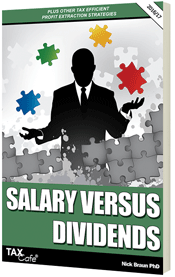How to Pay Tax at 10% on Interest Income
Low Tax Rate for Company Directors
WHEN it comes to interest income, many company directors are in a fortunate position.
Even those with very high incomes could end up paying just 10% tax on their interest earnings.
To find out how company owners can enjoy up to £6,000 of tax-free interest see our guide:
Salary versus Dividends
You can have a maximum £2,710 of interest income taxed at the 10% ‘starting rate’ during the current 2012/13 tax year.
Example 1
Mandy is a company director with a salary of £7,605 per year and interest income of £3,210. She has no other income. There is no income tax or employee’s national insurance on her salary. £500 of her interest income is covered by her remaining income tax personal allowance (£8,105 in 2012/13). The remaining £2,710 of her interest income is covered by the starting rate band and taxed at 10%.
The starting rate is supposed to benefit only those with very low incomes. Hence the £2,710 starting rate band is reduced by any other taxable non-savings income you have including:
- Employment income
- Self-employment income
- Pensions
- Rental profits
If your taxable non-savings income exceeds the £2,710 starting rate band, none of your interest income will be taxed at 10%.
Example 2
The facts are exactly the same as Example 1 except Mandy also has £5,000 of rental profit from a buy-to-let property. £500 of her rental profit is tax-free thanks to her remaining income tax personal allowance. The balance of £4,500 is Mandy’s taxable non-savings income. Because Mandy’s taxable non-savings income exceeds the £2,710 starting rate band, none of her interest income is taxed at 10%. All of it is taxed at 20%.
Of course, most regular salary earners and self-employed business owners have more than £2,710 of taxable non-savings income.
Many company directors are in a different position. Note that the above list does NOT include dividends. Dividends are the top slice of income and do not use up the starting rate band.
Because company owners often pay themselves small salaries and take the rest of their income as dividends, they will often have little or no ‘non-savings income’. As a result they will often pay no more than 10% tax on their interest income.
Example 3
Mandy is a company director with a salary of £7,605, interest income of £3,210 and dividends of £25,000. She has no other income. There is no income tax or employee’s national insurance on her salary. £500 of her interest income is covered by her income tax personal allowance. The remaining £2,710 of her interest income is taxed at 10%. All of her dividends are tax free because she is not a higher-rate taxpayer (her total income is less than £42,475).
Hence many company directors will pay no more than 10% tax on their interest income if:
- They take a small salary from their company,
- Do not have another sole trader or partnership business, and
- Rental profits from buy-to-let properties do not use up the £2,710 starting rate band.
The 10% tax rate could be useful to company directors who pay themselves a substantial cash dividend, perhaps at the start of the tax year. Unless they have an offset mortgage or invest the money immediately in an ISA or SIPP, they will pay income tax on any interest generated by their cash lump sum.
The 10% tax rate is also useful to company directors who receive interest income from their own companies.
If you lend money to your company, you are entitled to pay yourself interest. A good example would be a company that declares a dividend but does not make a cash payment to the director, leaving the amount outstanding on the director’s loan account.
Paying interest is one of the most tax efficient ways to extract money from your company:
- The interest will usually be a tax deductible expense for the company, typically attracting corporation tax relief at 20%.
- No national insurance is payable
- Income tax is possibly payable at just 10%
The company must, however, deduct income tax at source at 20% on the payment of interest and must pay this to HMRC quarterly. The director can reclaim any excess when they submit their tax return.






